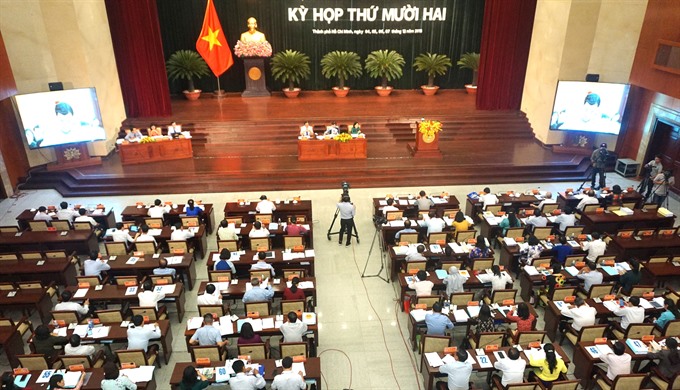 Society
Society

The members of the city’s People’s Council and leaders of city government agencies continued their question and answer session yesterday (on Thursday Dec 6) about hot issues, including educational reform, flooding, and food safety and hygiene, during the 12th session of the council’s IX meeting.
 |
| Members of the People’s Council meet with heads of city departments at a question and answer session during the 12th session of the city’s People’s Council’s IX meeting on Thursday. — VNA/VNS Photo Thu Hoài |
HCM CITY — The members of the city’s People’s Council and leaders of city government agencies continued their question and answer session yesterday (Dec 6) about hot issues, including educational reform, flooding, and food safety and hygiene, during the 12th session of the council’s IX meeting.
At the session, council member Trương Lê Mỹ Ngọc asked: “When will the new set of textbooks for HCM city students be published?”
Lê Hồng Sơn, director of the city’s Department of Education and Training, said the department was working with Việt Nam Education Publishing House to compile a new set of textbooks for students which would not be released in the 2019-2020 school year.
The new set of textbooks would be compiled not only for students in HCM City but also for other localities.
Textbook content is based on the new general education programme issued by the Ministry of Education and Training, he said.
More specific content has been added, and the teaching programme for natural science and social science has been combined.
The Ministry recently issued a framework for the new general education curriculum, but details on each subject are unavailable.
After issuing the new curricula, the department and the Việt Nam Education Publishing House will start compiling the textbooks.
When completed, the two units will submit the books to the Ministry of Education and Training for approval.
If the ministry allows their use, the department will not interfere in the decisions regarding textbook selection, which will depend on school boards and teachers, Sơn said.
People’s Council chairwoman Nguyễn Thị Quyết Tâm asked: “Should HCM City have a new set of textbooks? The ministry already has textbooks, so the decision depends on the choice of the schools. The quality of the textbooks has not been figured out. What about the budget performance?”
Sơn said: "I am personally confident with the human resources, experts and collaborators. The city will have good quality textbooks and there will be harmony between theory and practice.”
Many schools in the city and in neighboring provinces will use the new textbooks, he said.
At the meeting, council member Lê Nguyễn Minh Quang pointed out that the project to upgrade Hy Vọng Canal had stopped.
The canal plays an important role in flood control for Tân Sơn Nhất airport and Tân Bình District, he said. “The Steering Centre of the Urban Flood Control Programme must come up with solution in the coming time.”
Nguyễn Hoàng Anh Dũng, deputy head of the Steering Centre of the Urban Flood Control Programme, said Hy Vọng, A41, and Nhật Bản canals are the main drainage canals near the airport.
In 2016 and last year, the city completed the upgrading of Nhật Bản Canal and directed the district’s units to pay compensation and complete site clearance for the two other canals, Dũng said.
The Hy Vọng Canal, with 1.8km in length and 5 to 11m in width, has total investment of VNĐ150 billion (US$6.4 million).
“The centre is working with Tân Bình District authorities to speed up the process of compensation and site clearance and dredge canals periodically,” Dũng said.
Flooding in this area is often caused by litter dumped in the canals and drainage systems.
In response to the handling of violations, Nguyễn Toàn Thắng, head of the city’s Department of Natural Resources and Environment, said the city this year handled 296 violations for littering in public, in canals, and in drainage systems.
Thắng said that handling the cases was difficult because of the lack of human resources and recording equipment.
Most offenders are hawkers with a low income, while the penalty is high. And there is no sanction for dumping construction waste in public places.
Thắng said the city should allow the department to use images extracted from security cameras and traffic cameras to help them handle violators.
The head of the HCM City Food Safety Management Board, Phạm Khánh Phong Lan, said the board, beginning in February, had ensured that pork at wholesale markets in the city had traceable origins.
Next year, the board plans to apply a safe-food market model to 240 traditional markets in the city, she said.
The city is also building more safe food chains through linkages with neighboring provinces and cities.
Regarding hygiene at poultry and cattle slaughterhouses in the city, director of the city’s Department of Agriculture and Rural Development, Nguyễn Phước Trung, said that one modern slaughterhouse was put into operation in Hóc Môn District, two establishments were being built, and two others were in the construction licensing process.
By June, the city plans to stop operation of all traditional slaughterhouses that cannot ensure food safety and hygiene regulations. — VNS




